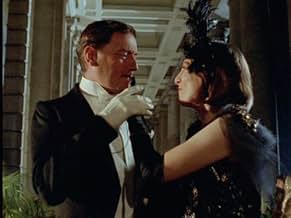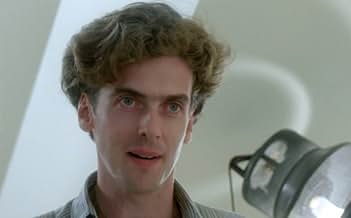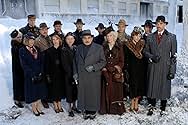Unterstützt von seinen eleganten und vertrauenswürdigen Sidekicks, löst der exzentrische belgische Detektiv Hercule Poirot eine Reihe kniffliger Fälle zwischen England un Ägypten.Unterstützt von seinen eleganten und vertrauenswürdigen Sidekicks, löst der exzentrische belgische Detektiv Hercule Poirot eine Reihe kniffliger Fälle zwischen England un Ägypten.Unterstützt von seinen eleganten und vertrauenswürdigen Sidekicks, löst der exzentrische belgische Detektiv Hercule Poirot eine Reihe kniffliger Fälle zwischen England un Ägypten.
- Für 1 Primetime Emmy nominiert
- 6 Gewinne & 17 Nominierungen insgesamt
Folgen durchsuchen
Zusammenfassung
Reviewers say 'Poirot' is acclaimed for David Suchet's definitive portrayal of Hercule Poirot and high production values. The series is celebrated for faithful adaptations, engaging supporting performances, and an elegant 1930s setting. Common praise includes clever plotting and Poirot's charm. However, criticisms note formulaic episodes, predictability, and creative liberties in later seasons. The darker tone in final seasons receives mixed reactions, with some feeling it detracts from the original charm.
Empfohlene Bewertungen
I literally grew up with Poirot, Sunday nights as a nine and ten year old were all about Poirot, Pistachio nuts, Terry's Pyramint.
The productions evolved over time, the early hour long format episodes were much lighter viewing, over time they became more gritty, more daring. One good example is Series 3's Plymouth Express, a much darker presentation they anything that had gone before. By the time you reach Elephants can remember in Series 13 there was something very dark about the production.
I would imagine it became more difficult for the producers over time, they were able to cherry pick adaptations during the early years, some books were much more suitable to the screen then others, The ABC murders and Death in the Clouds would have been so much easier to work with then say The Big Four or Cards on the Table.
The adaptations remained fairly faithful to the book, there was never a fear of them doing what they did with the Marple series, and transplant Poirot into novels he was never intended to be in, for a good reason each of her works had a certain flavour. A few times changes were made to the books, I can only imagine for good reason, too many characters, budget restraints etc. The Big Four and Appointment with death being altered more then some.
So good was David Suchet in the role, that now when you think of Poirot you see David in your mind. I think it will be a while before someone attempts to remake Poirot for the small screen. David had a lot to live up to, Poirot had hit the big screen, Murder on the Orient Express and Death on the Nile had both been huge adaptations, the remakes both compete favourably. Suchet is Poirot.
Characters were switched and added quite a lot, Hastings, Japp and Miss Lemon were often drafted in, but in later years that wasn't the case. It's hardly surprising as each is so enjoyable. Watching them all reunite in 'Lord Edgeware dies' was special.
Generally the productions were very good to excellent, for me at the top of the pile are The ABC Murders, Curtain and Sad Cypress, each are literally flawless. The Murder of Roger Ackroyd and The Big Four are two of the relatively few lesser offerings, with the only true misfire being Murder in Mesopotamia.
For years I hoped for the productions to be completed, at times it seemed like they'd never get through them, I'm so glad they did, but I am missing him.
Who knows maybe one day The Monogram Murders will be made, not a Christie story I know, but it would be worth it to see Poirot anew once again. This truly was a fabulous series. 10/0
The productions evolved over time, the early hour long format episodes were much lighter viewing, over time they became more gritty, more daring. One good example is Series 3's Plymouth Express, a much darker presentation they anything that had gone before. By the time you reach Elephants can remember in Series 13 there was something very dark about the production.
I would imagine it became more difficult for the producers over time, they were able to cherry pick adaptations during the early years, some books were much more suitable to the screen then others, The ABC murders and Death in the Clouds would have been so much easier to work with then say The Big Four or Cards on the Table.
The adaptations remained fairly faithful to the book, there was never a fear of them doing what they did with the Marple series, and transplant Poirot into novels he was never intended to be in, for a good reason each of her works had a certain flavour. A few times changes were made to the books, I can only imagine for good reason, too many characters, budget restraints etc. The Big Four and Appointment with death being altered more then some.
So good was David Suchet in the role, that now when you think of Poirot you see David in your mind. I think it will be a while before someone attempts to remake Poirot for the small screen. David had a lot to live up to, Poirot had hit the big screen, Murder on the Orient Express and Death on the Nile had both been huge adaptations, the remakes both compete favourably. Suchet is Poirot.
Characters were switched and added quite a lot, Hastings, Japp and Miss Lemon were often drafted in, but in later years that wasn't the case. It's hardly surprising as each is so enjoyable. Watching them all reunite in 'Lord Edgeware dies' was special.
Generally the productions were very good to excellent, for me at the top of the pile are The ABC Murders, Curtain and Sad Cypress, each are literally flawless. The Murder of Roger Ackroyd and The Big Four are two of the relatively few lesser offerings, with the only true misfire being Murder in Mesopotamia.
For years I hoped for the productions to be completed, at times it seemed like they'd never get through them, I'm so glad they did, but I am missing him.
Who knows maybe one day The Monogram Murders will be made, not a Christie story I know, but it would be worth it to see Poirot anew once again. This truly was a fabulous series. 10/0
A literary legend became a TV phenomenon when David SUCHET took on the role of Hercule Poirot, Agatha Christie's most famous sleuth. Suchet's Poirot became the most-watched detective in the history of the PBS Mystery! series and a hit all over again on A&E. Now, all 36 one-hour episodes from the series are available in this 12-disc Classic Collection. Using his "little Grey cells" and aided by the affable Captain Hastings (Hugh Fraser), Poirot unravels the thorniest cases without mussing a hair of his famously sculpted mustache. Lush art deco period details and scripts infused with delicious Christie wit make these mysteries irresistible.
Starring: David Suchet, Hugh Fraser, Philip Jackson, Pauline Moran. Director: Andrew Grieve, Edward Bennett.
Starring: David Suchet, Hugh Fraser, Philip Jackson, Pauline Moran. Director: Andrew Grieve, Edward Bennett.
David Suchet is absolutely the best Hercule Poirot I have ever seen. He personifies the Hercule in Agatha Christie's books perfectly. Also, Hugh Fraser (Hastings) and Philip Jackson (Japp) play their parts wonderfully. This show has a very good story line and each episode has a baffling mystery. If you are a mystery fan, I recommend this show to you. Make sure you look for it!
Mystery fans were fortunate in the late 1980s to have no less than 3 definitive television performances to enjoy: Jeremy Brett as Sherlock Holmes, Joan Hickson as Miss Marple, and David Suchet as Hercule Poirot. Suchet's performance as the fussy little Belgian detective was a joy. Every detail of the character was perfect, from the stilted, pedantic delivery to the exquisitely fastidious grooming. Suchet's skill as an actor was such that he was able to turn a rather flat, implausible character (and even fans of Agatha Christie admit that her characters are pretty two-dimensional) into a complex, eccentric but essentially believable person. Some of the credit for this also goes to the fine writing in the series. The writers were responsible for fleshing out the bare bones provided by Christie's stories, but they did it in such a way that the filmed versions flow naturally and seamlessly. The supporting actors were also very fine, especially Hugh Fraser as Captain Hastings - whereas in the stories Hastings, who is usually the narrator, remains a rather sketchy character, here he becomes a genuine person. He is not Poirot's mental equal by any means, but admirable in his sympathy, kindness and general embodiment of Englishness, and we can understand Poirot's affection for Hastings. It's difficult to see how this dramatization can be improved upon.
The adventures of eccentric Belgiun sleuth Hercule Poirot and Captain Hastings, his British through and through sidekick. Other characters to appear in most episodes include Poirot's secretary and close friend Miss Lemon and Chief Inspector Japp of Scotland Yard who is close to Poirot even though he has often been outwitted by him and cannot adjust to Poirot's eccentric lifestyle.
Since it began in 1989 with "The Adventure Of The Clapham Cook", over thirty episodes have been made, including hour-long dramatisations of Agatha Christie's short stories and feature-length episodes of the full length novels featuring the detective. The series for some people marked a breath of fresh air from the overblown cinema films of the 1970's-80's like "Murder On The Orient Express" and "Evil Under The Sun", in which actors were cast on the basis of their celebrity status rather than their suitability to Agatha Christie's characters. This series has always chosen actors who are not big name stars, but many have had wide experience on stage and television and suit the parts down to the ground. The series is also distinguished by its impeccable production values and a remarkable attention to period detail of the mid-1930's with its cars, clothes and gloriously designed art-deco sets. In 1997 David Suchet announced that he would never play Poirot again after the filming of "Dumb Witness", but fortunately he has since returned his most celebrated role and it looks as if we've got many more of these quality films to look forward to. Of course the series has often fallen below it's own standard, but I am one who feels that Suchet is the definitive Poirot, just like some believe Joan Hickson to be the definitive Miss Marple. Suchet really does live his most famous role. In an interview he talked about how he has read all of Agatha Christie's Poirot novels and in doing so has created a dossier of all the characters eccentricities and habits in order to enhance his excellent performances.
Here are some of my favourite episodes;
1. Evil Under The Sun (2002) 2. Lord Edgware Dies (2000) 3. The ABC Murders (1992) 4. The Mystery Of Hunters Lodge (1991) 5. One Two Buckle My Shoe (1992) 6. The Case Of The Missing Will (1993)
The Case Of The Missing Will stands out for me because the original short story by Christie was very short and there wasn't much to it, it gave me the impression of something she wrote just to fill the gap in the short story collection entitled "Poirot Investigates". The screen writers had to add to it considerably, even to the extent of adding new characters and plot wise there was very little of the Christie stuff left in it. Sometimes you'd expect this situation to end in disaster, but in view of the circumstances I feel they did a first rate job. Like other episodes it was beautifully made as well.
The ABC Murders is another episode which is essential viewing for fans of this series. It had only been filmed once before as a dreadful comedy version called "The Alphabet Murders" in 1965, which starred Frank Tashlin as Poirot and Robert Morley as Hastings. In ITV's version under the skilled direction of Andrew Grieve, impeccable performances and tight editing, it came to full-blooded life as a dark, sinister and overall exciting thriller as Poirot tracks down an evil serial killer who travels around the country choosing his victims by their initials in the order of the alphabet. This really should have made the big-screen paired with the above in support.
Since it began in 1989 with "The Adventure Of The Clapham Cook", over thirty episodes have been made, including hour-long dramatisations of Agatha Christie's short stories and feature-length episodes of the full length novels featuring the detective. The series for some people marked a breath of fresh air from the overblown cinema films of the 1970's-80's like "Murder On The Orient Express" and "Evil Under The Sun", in which actors were cast on the basis of their celebrity status rather than their suitability to Agatha Christie's characters. This series has always chosen actors who are not big name stars, but many have had wide experience on stage and television and suit the parts down to the ground. The series is also distinguished by its impeccable production values and a remarkable attention to period detail of the mid-1930's with its cars, clothes and gloriously designed art-deco sets. In 1997 David Suchet announced that he would never play Poirot again after the filming of "Dumb Witness", but fortunately he has since returned his most celebrated role and it looks as if we've got many more of these quality films to look forward to. Of course the series has often fallen below it's own standard, but I am one who feels that Suchet is the definitive Poirot, just like some believe Joan Hickson to be the definitive Miss Marple. Suchet really does live his most famous role. In an interview he talked about how he has read all of Agatha Christie's Poirot novels and in doing so has created a dossier of all the characters eccentricities and habits in order to enhance his excellent performances.
Here are some of my favourite episodes;
1. Evil Under The Sun (2002) 2. Lord Edgware Dies (2000) 3. The ABC Murders (1992) 4. The Mystery Of Hunters Lodge (1991) 5. One Two Buckle My Shoe (1992) 6. The Case Of The Missing Will (1993)
The Case Of The Missing Will stands out for me because the original short story by Christie was very short and there wasn't much to it, it gave me the impression of something she wrote just to fill the gap in the short story collection entitled "Poirot Investigates". The screen writers had to add to it considerably, even to the extent of adding new characters and plot wise there was very little of the Christie stuff left in it. Sometimes you'd expect this situation to end in disaster, but in view of the circumstances I feel they did a first rate job. Like other episodes it was beautifully made as well.
The ABC Murders is another episode which is essential viewing for fans of this series. It had only been filmed once before as a dreadful comedy version called "The Alphabet Murders" in 1965, which starred Frank Tashlin as Poirot and Robert Morley as Hastings. In ITV's version under the skilled direction of Andrew Grieve, impeccable performances and tight editing, it came to full-blooded life as a dark, sinister and overall exciting thriller as Poirot tracks down an evil serial killer who travels around the country choosing his victims by their initials in the order of the alphabet. This really should have made the big-screen paired with the above in support.
Wusstest du schon
- WissenswertesBefore playing Poirot, David Suchet played Chief Inspector Japp opposite Peter Ustinov as Hercule Poirot in Mord à la Carte (1985). Suchet considers his performance as Japp to be the worst performance of his career, while he considers Poirot to be his best.
- PatzerThe opening music and titles to Poirot together set the scene that these are tales from the 1930's. Towards the end of the titles, a stylised and complete Battersea Power Station is shown, which was built in two phases the second of which was not finished until the early 1950's.
- Zitate
[repeated line]
Captain Hastings: I say, Poirot!
- Crazy CreditsThe opening titles have Poirot disembark at a train station and bow to the viewer.
- VerbindungenFeatured in There's Something About Christie... Murder Made Simple (2007)
Top-Auswahl
Melde dich zum Bewerten an und greife auf die Watchlist für personalisierte Empfehlungen zu.
Details
- Erscheinungsdatum
- Herkunftsland
- Offizieller Standort
- Sprachen
- Auch bekannt als
- Poirot
- Drehorte
- Produktionsfirmen
- Weitere beteiligte Unternehmen bei IMDbPro anzeigen
Zu dieser Seite beitragen
Bearbeitung vorschlagen oder fehlenden Inhalt hinzufügen












































